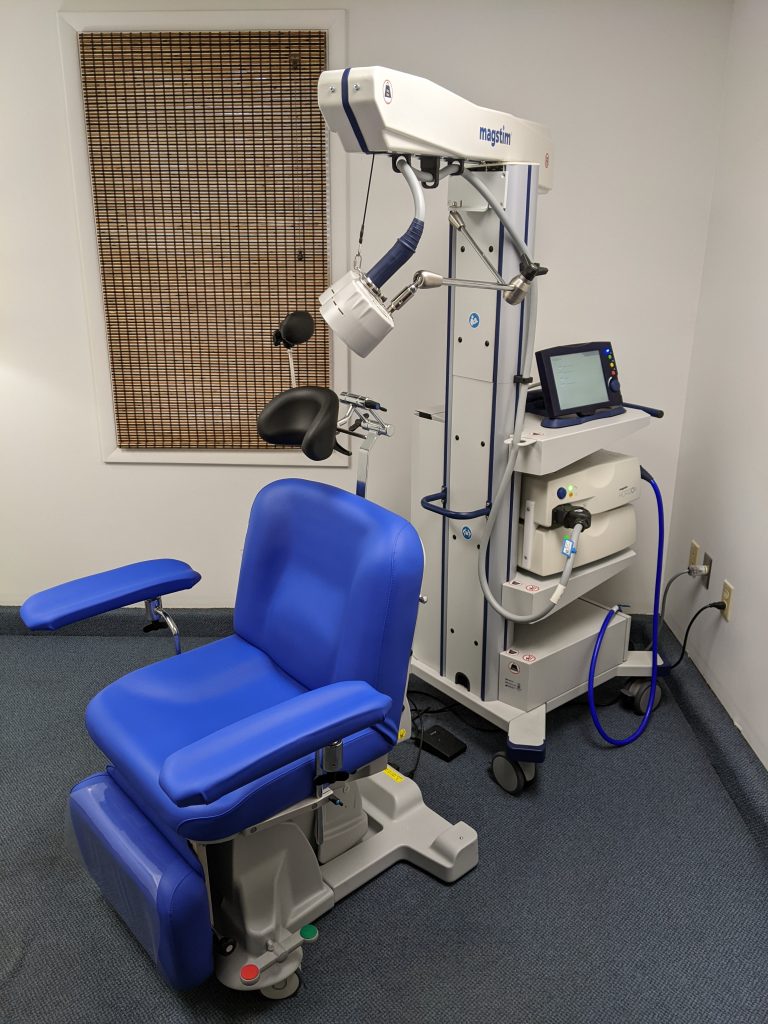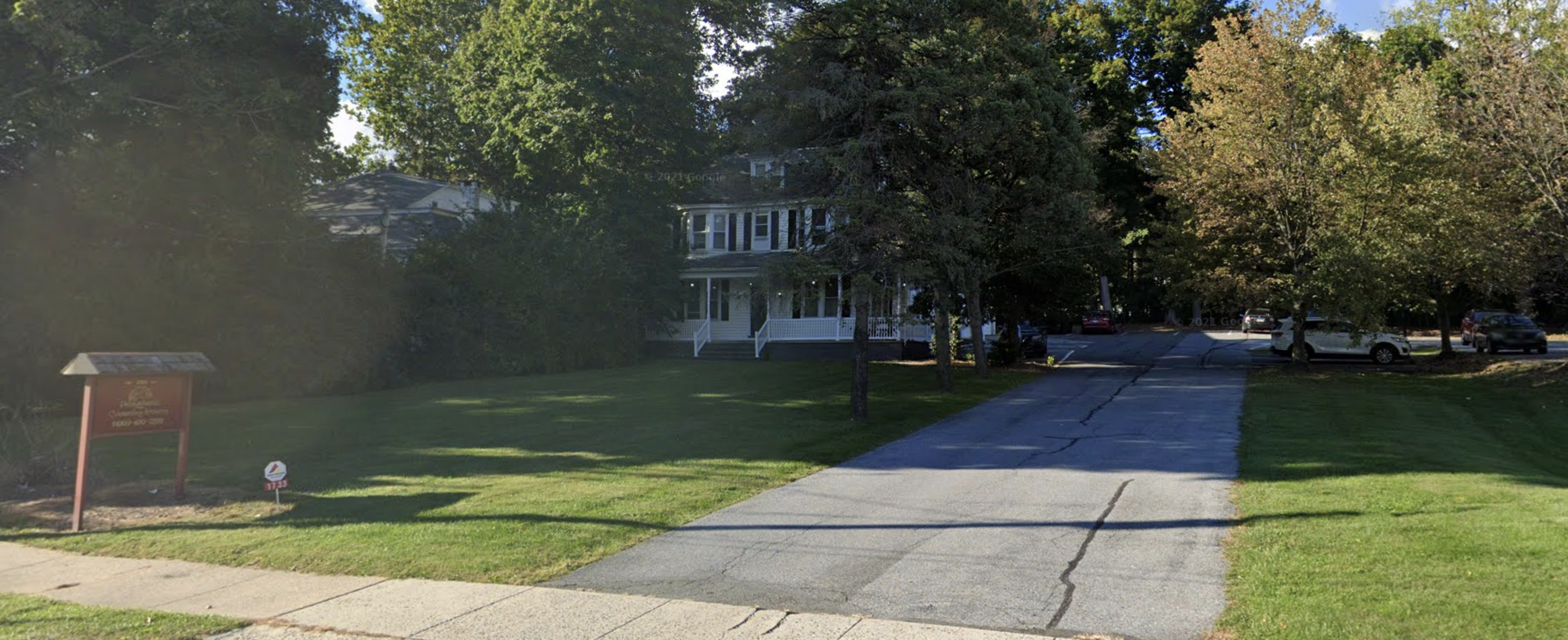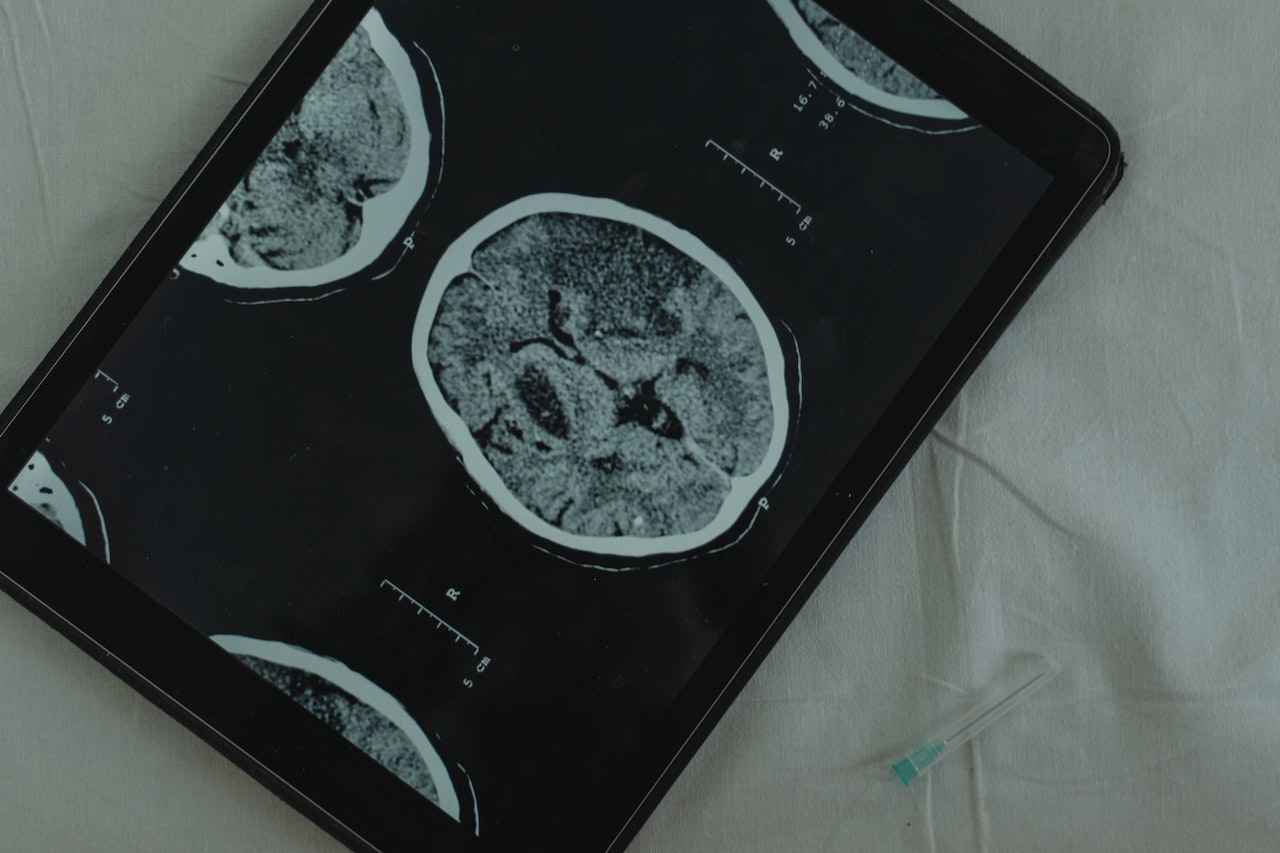Transcranial Magnetic Stimulation – Alternative Depression Treatment
TMS Therapy® for Depression:
Depression treatment traditionally involves antidepressants, but an estimated 4 million sufferers of depression do not find the needed relief from medication. Transcranial Magnetic Stimulation (TMS) is a leading alternative treatment for fighting depression. TMS Therapy is FDA-cleared for treating Major Depression when improvement from prior antidepressant medications have not yielded satisfactory results.
Transcranial Magnetic Stimulation (TMS)
Transcranial Magnetic Stimulation creates short electromagnetic pulses to stimulate nerve cells in the area of the brain thought to control mood. These pulses come in quick procession and are thought to increase levels of Neurotransmitters in areas of the brain rendered dormant by depression. TMS Therapy is not only effective, but possibly the least intrusive depression treatment . Treatments are considered outpatient procedures, with most performed right at a psychiatrist’s office under his or her supervision while you remain awake and alert. Typical TMS treatment courses consists of 5 treatments per week over a 4-6 week period, or a total of 20-30 treatments. Each depression treatment session lasts approximately 37 minutes.
TMS Therapy is:
- Non-invasive, meaning that it does not involve surgery. It does not require any anesthesia or sedation, as the patient remains awake and alert during the treatment.
- Non-systemic, meaning that it is not taken by mouth and does not circulate in the blood stream throughout the body.
What to Expect
An initial consultation will be scheduled to discuss what is troubling you and whether TMS is an appropriate treatment. At that time, you and your doctor will review your symptoms, treatment history, and possible treatment options.
If TMS is the right treatment for you, treatment sessions can be scheduled to begin immediately. At the first treatment appointment, we will determine the optimal placement and strength of the magnetic field. Each subsequent treatment will last 37 minutes during which you will be awake and alert. The magnetic pulses make a loud clicking sound and feel like a tapping on the scalp but do not result in more than mild discomfort. If you wish, you can watch television or listen to music during the TMS session.
After the treatment, you can drive and resume your normal activity. TMS is non-invasive, meaning it does not involve surgery and has no systemic effects. Typical TMS side effects are transient and mild irritation or discomfort at the treatment site and headache.
A usual course of depression treatment involves sessions 5 days a week for 4 to 6 weeks, although this can vary depending on your response. As you progress through your treatment, we will regularly assess with you your status and determine with you the eventual number of treatments.

What to Expect
An initial consultation will be scheduled to discuss what is troubling you and whether TMS is an appropriate treatment. At that time, you and your doctor will review your symptoms, treatment history, and possible treatment options.
If TMS is the right treatment for you, treatment sessions can be scheduled to begin immediately. At the first treatment appointment, we will determine the optimal placement and strength of the magnetic field. Each subsequent treatment will last 37 minutes during which you will be awake and alert. The magnetic pulses make a loud clicking sound and feel like a tapping on the scalp but do not result in more than mild discomfort. If you wish, you can watch television or listen to music during the TMS session.
After the treatment, you can drive and resume your normal activity. TMS is non-invasive, meaning it does not involve surgery and has no systemic effects. Typical TMS side effects are transient and mild irritation or discomfort at the treatment site and headache.
A usual course of depression treatment involves sessions 5 days a week for 4 to 6 weeks, although this can vary depending on your response. As you progress through your treatment, we will regularly assess with you your status and determine with you the eventual number of treatments.


About Us
We provide patients in Reading, PA and surrounding South Central Pennsylvania communities with the latest in depression treatments. Transcranial Magnetic Stimulation Therapy is one of the most technologically advanced depression treatments available. This non-invasive, outpatient therapy is FDA-cleared and has helped thousands of depression patients who have not received adequate results from antidepressants or other depression treatments.
Pennsylvania Counseling Services provides counseling, therapy, addiction, and psychiatric treatment to individuals and families in ten counties in South Central Pennsylvania. Our facility located at 1733 Penn Avenue Reading, PA 19609 provides TMS therapy for depression treatment. TMS treatment is provided by and under the direction of Dr. Zahid Awan, our Chief Medical Officer. Dr. Awan was trained in TMS treatment many years prior to its FDA clearance and is pleased to add this valuable and effective treatment for depression to his practice.
Learn more about Pennsylvania Counseling Services as a company.
About Us
We provide patients in Reading, PA, and surrounding South Central Pennsylvania communities with the latest in depression treatments. Transcranial Magnetic Stimulation Therapy is one of the most technologically advanced depression treatments available. This non-invasive, outpatient therapy is FDA-cleared and has helped thousands of depression patients who have not received adequate results from antidepressants or other depression treatments.
Pennsylvania Counseling Services provides counseling, therapy, addiction, and psychiatric treatment to individuals and families in ten counties in South Central Pennsylvania. Our facility located at 1733 Penn Avenue Reading, PA 19609 provides TMS therapy for depression treatment. TMS treatment is provided by and under the direction of Dr. Zahid Awan, our Chief Medical Officer. Dr. Awan was trained in TMS treatment many years prior to its FDA clearance and is pleased to add this valuable and effective treatment for depression to his practice.
Learn more about Pennsylvania Counseling Services as a company.

How TMS Works
TMS devices work by generating highly concentrated electromagnetic pulses which turn on and off very rapidly. These pulses are targeted at areas of the brain involved in mood regulation and shown to be inactive in patients suffering from depression.
As these magnetic fields move into the brain, they produce very small electrical currents. These electrical currents are thought to activate brain cells in these inactive regions and release neurotransmitters like serotonin, norepinephrine, and dopamine – all of which work to naturally help lessen the symptoms of depression.
The exact mechanics of TMS Therapy are still of unknown origin, but the science behind TMS is constantly being explored and understood. Today, researchers can only observe the effects that electromagnetic stimulation from TMS has on the brain. However, this is changing as more study goes into TMS technology.

How TMS Works
TMS devices work by generating highly concentrated electromagnetic pulses which turn on and off very rapidly. These pulses are targeted at areas of the brain involved in mood regulation and shown to be inactive in patients suffering from depression.
As these magnetic fields move into the brain, they produce very small electrical currents. These electrical currents are thought to activate brain cells in these inactive regions and release neurotransmitters like serotonin, norepinephrine, and dopamine – all of which work to naturally help lessen the symptoms of depression.
The exact mechanics of TMS Therapy are still of unknown origin, but the science behind TMS is constantly being explored and understood. Today, researchers can only observe the effects that electromagnetic stimulation from TMS has on the brain. However, this is changing as more study goes into TMS technology.

TMS devices work by generating highly concentrated electromagnetic pulses which turn on and off very rapidly. These pulses are targeted at areas of the brain involved in mood regulation and shown to be inactive in patients suffering from depression.
As these magnetic fields move into the brain, they produce very small electrical currents. These electrical currents are thought to activate brain cells in these inactive regions and release neurotransmitters like serotonin, norepinephrine, and dopamine – all of which work to naturally help lesson the symptoms of depression.
The exact mechanics of TMS Therapy are still of an unknown origin, but the science behind TMS is constantly being explored and understood. Today, researchers can only observe the effects that electromagnetic stimulation from TMS has on the brain. However this is changing as more study goes into TMS technology.
TMS Therapy is a new and alternative therapy cleared by the FDA in the treatment of Major Depressive Disorder, specifically when medicines have not yielded satisfactory results.
TMS Therapy utilizes an electromagnetic pulse to activate regions of the brain that are made dormant by depression. The subsequent raising of neurotransmitter levels in these regions is thought to be what lessons the symptoms of depression.
It usually takes time for healthcare insurers to establish coverage policies for newly approved treatments such as TMS Therapy. To date, many commercial and Medicare plans have included at least partial coverage for TMS Therapy, with more providers adding coverage every year.
TMS is non-systemic (does not circulate in the blood throughout the body), so it does not have side effects such as weight gain, sexual dysfunction, nausea, dry mouth, sedation, etc. The most common side effects reported during clinical trials were headache and scalp discomfort – generally mild to moderate – occurring less frequently after the first week of treatment.
No. TMS Therapy utilizes a highly focused electromagnetic pulse with an intensity similar to that of an MRI machine. Other popularized uses of magnets for health benefits involve using a static magnetic field. These products deliver weak and undirected static fields which are not capable of activating brain cells.
While both TMS and Electroconvulsive Therapy (ECT) are effective in the treatment of depression, there are many differences in safety and tolerability. Both are designed to treat depression through the application of energy into the brain, but the similarities quickly dissolve.
ECT is a much more intensive and invasive procedure than is TMS Therapy. ECT applies electicity to the brain, which is designed to create seizures and requires hospitalization. The side effects from ECT are much more intense and occur in more instances. TMS utilizes electromagnetic pulses, and is an outpatient procedure with little side-effects.
The ability for TMS to provide relief of symptoms varies greatly from person. Therefore the length of a TMS Therapy course can vary greatly. Your doctor will recommend a schedule of sessions based on your individual need and response to treatment. So while patients typically receive 20-30 treatments over a 4-6 week period, the actual number of treatments can range anywhere from 10-60 treatments over a 4-10 week period. Treatments are performed during the weekdays usually five days a week and each procedure lasts approximately 30-60 minutes.
TMS is a generally safe procedure with over two decades of intense clinical and scientific research behind it. In 10,000 treatments during clinical trials, the most common side effects is mild to moderate scalp discomfort and mild headaches, both of which usually went away in the first week of treatments. In a very small percentage of instances there were reports of acute memory loss, minimal cognition interruption, facial twitching, and seizures. These side effects were acute and TMS showed no long-term issues.
No, the most common side effect related to treatment was scalp discomfort during treatment sessions. This side effect was generally mild to moderate, and occurred less frequently after the first week of treatment.
If necessary, you can treat this discomfort with an over-the-counter analgesic. If these side effects persist, your doctor can temporarily reduce the strength of the magnetic field pulses being administered in order to make treatment more comfortable.
Maintenance TMS is a large area of study with this technology. In a clinical trial, 2 out of 3 patients who had either responded to treatment or completely remitted their depression symptoms reported 12 months later that they remained at the level they were at the end of the trial. Additionally, after the trial, only 1 in 3 patients needed to return for ‘maintenance’ TMS sessions.
Patients may continue to take antidepressant medication while receiving TMS therapy if determined appropriate by the physician.
Contact Us
Phone:
Office Hours:
Monday thru Friday:
8:00am – 5:00pm
Address:
TMS Patient Experiences
In the Media:
TMS on The Daily Show: Comedian Neal Brennan discusses how TMS Therapy did more for his depression than any other treatment (clip starts at 2:30).
Transcranial Magnetic Stimulation (TMS) has been featured in several prominent news publications highlighting its success in depression treatment. Among these publications and television shows are: Dr. Oz, TIME Magazine, Scientific American, and Good Housekeeping. See below for more news stories discussing the latest applications of TMS Therapy.
08/01/2017 Healthline: Treatment That Rewires the Brain Could Treat Depression
07/25/2017 Psychiatry Advisor: TMS Treats Rx-Resistant Depression In Older and Younger Adults
07/21/2017 Fibromyalgia Today: TMS Could Help Relieve Fibromyalgia Pain
07/18/2017 Reader’s Digest: TMS Finally Lifted My Depression After Everything Else Failed
07/05/2017 Charlotte Observer: On the radio, he brings life to the party. Off it, depression nearly killed him.
Testimonials:
I was severely depressed over a period of three years. I tried several antidepressants but nothing really seemed to work. I had a severe allergic reaction. My family was very poorly impacted by the whole problem of my depression. By the end of the TMS treatment, things were better than I could have imagined. After that six week, I was so excited that my life was starting to resume. It could actually get better and that I had more to look forward to.
– Garret A.
During that time, it was probably the darkest time in my life. I was sad and miserable all the time. Before when I was going through depression, I felt hopeless. Since TMS, my perspective on life has been so positive that I know there is hope.
– Martha F.

